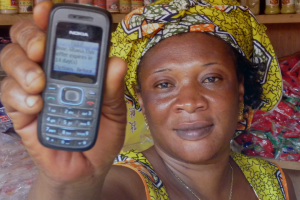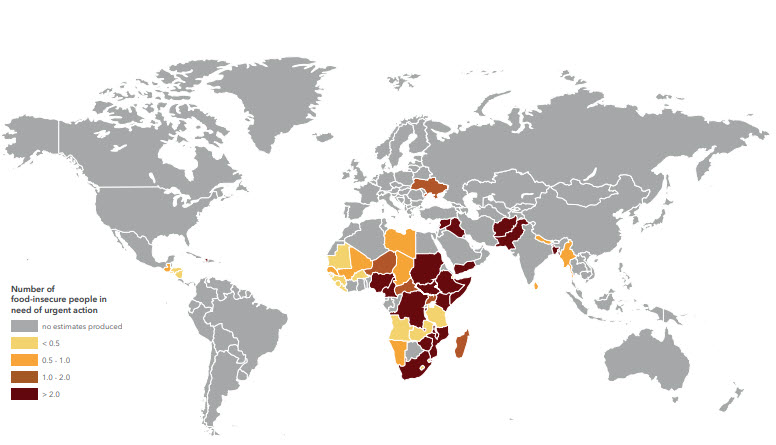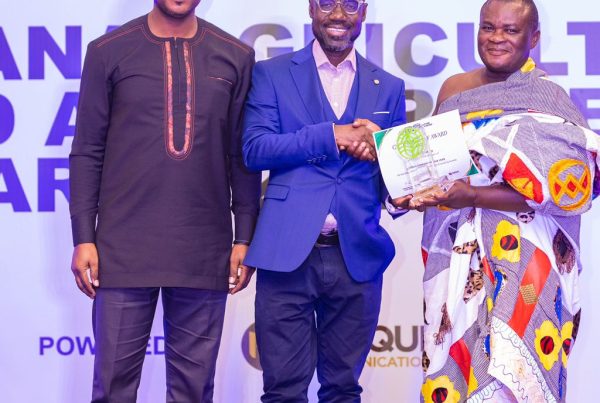Thomas Jefferson couldn’t have put it better when he said, “Agriculture is our wisest pursuit, because it will in the end contribute most to real wealth, good morals, and happiness.”
The world is slowly running out of food, and the solution to this problem is agriculture. By agriculture we mean responsible crop farming, sustainable aquaculture and fisheries, livestock production and forestry. Unfortunately, our oceans and river bodies are constantly polluted with careless abandon, leading to aquatic lives going extinct and depletion of the biodiversity. Extreme climate shocks are causing farmlands to be lost and a decline in world food stocks.
Fighting food insecurity requires a global effort
Finding a lasting solution to a food insecure world requires a concerted and unified global approach. Our food system is significantly affected by a combination of factors comprising population growth, climate change, bad agronomic practices, conflicts, environmental degradation, lack of market access, linkages and post-harvest management. A global intervention is necessary to help mitigate these effects; through the cooperation of countries, pro-activeness of government institutions, contribution of private organizations and civil society groups, as well as citizen participation. This is essential in meeting Sustainable Development Goals (SDGs) 2 and 12 which aim to eradicate hunger and ensure responsible consumption and production respectively by 2030.
Although a colossal task is at hand, a more determined and committed world can make it possible. According to AGRA, the increasing demand for food in Africa alone will create a market potential for food products worth US$1 trillion by 2030. This presents a great opportunity for the continent. Nonetheless, critical attention must be paid to the fast-rising number of mouths to be fed.
Currently, the world population is 7.7 billion and counting. Already, access to food is an existing challenge with over 820 million people reported to be without food and undernourished. We could be facing a worse situation where demand for food globally outstrips supply. A report published by the FAO detailing how the world should be fed, reveals that the world population will reach 9.1 billion by 2050. The projection reinforces the need for an immediate upsurge in agriculture investment.
Agriculture is hit the hardest by climate change
Another hurdle in realizing food security is global climate change. One of the hardest hits of this phenomenon is agriculture. Players within the food value chain, especially smallholder farmers annually count their losses instead of gains. Their losses, the world’s. And their gains, the world’s as well. Clearly, enough efforts aren’t being made to increase these gains and minimize the losses; the Intergovernmental Panel on Climate Change (IPCC) has predicted a 2 percent reduction in agriculture production for every 10 years until 2050.
According to the FAO, most settlers in rural sub Saharan Africa who engage in farming are forced to migrate due to climate change disturbances. Meanwhile, these rural dwellers produce three quarters of the world’s food. Worryingly, they constitute 80 percent of the global poor. The causes and solutions to climate change are well known, however, more energy is channeled into a flurry of world summits to the neglect of existing recommendations from previous conferences. Achieving global food security lies in our hands, and urgent action is overdue.
Encouraging Good Agriculture Practices for Food Security
The main players within the agriculture ecosystem are farmers. As such, policies and programs targeted at ensuring good agronomic practices must be well communicated to farmers at the grassroots level.
The effects of bad agronomic procedures are huge. They contribute to the numerous factors that are stifling the zero-hunger agenda. Some farmers are unaware of modern farming practices hence engage in primitive and environmental unfriendly farming methods. Some farmers use excessive pesticides, herbicides and fertilizers, posing damning threats to our food and nutrition.
 Having served over 1 million farmers in Africa, Esoko continues to provide farmers with tailored information services such as weather alerts, market access, agronomic advice, market linkage, nutrition advice among other innovative agriculture services via SMS, voice SMS and call centre. Farmers who call the farmer helpline are assisted in over 14 local languages on over 52 commodities. As farmers harvest their crops, they are linked to a buyer, and furnished with accurate market prices to help them negotiate better. These services help reduce wastage of farm produce at the farmgate and have been found to increase revenue of farmers by about 10 percent.
Having served over 1 million farmers in Africa, Esoko continues to provide farmers with tailored information services such as weather alerts, market access, agronomic advice, market linkage, nutrition advice among other innovative agriculture services via SMS, voice SMS and call centre. Farmers who call the farmer helpline are assisted in over 14 local languages on over 52 commodities. As farmers harvest their crops, they are linked to a buyer, and furnished with accurate market prices to help them negotiate better. These services help reduce wastage of farm produce at the farmgate and have been found to increase revenue of farmers by about 10 percent.
Thumps up to all the organizations, such as the FAO, CCAFS, WFP, IFAD etc, who continue to make contributions in ensuring food security. An eleven-year-old, Dimiana has chosen farming as a career after she benefited from a training organized by the FAO in Kenya. Dimiana has already turned her school’s backyard into a lush vegetable farm. This is a great start and a plus to the global food security project. An example to the many unemployed youth in Africa who see agriculture as an unattractive venture. Change always starts small and begins with someone. Dimiana has started. And, so can you. You don’t necessarily need to farm. Protect the environment. Reduce food wastage. We can all strive to make little changes to help secure our future…



